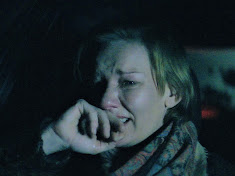Anatomy of a Fall is, simply put, a terrific film. The critical consensus has earned a very high Metacritic rating of 86 and an even higher 96 on Rotten Tomatoes. I believe the movie likely will be honored as among the best movies of the year when awards season gets rolling in January. Currently playing widely in theaters, its streaming debut date is uncertain, but reportedly will be in early 2024 (presumably after award nominations are announced). The picture has already been awarded the Palm d’Or [Golden Palm], the top prize at the Cannes Film Festival this past May. [The film also received another well-deserved prize when Messi, a border collie, won the coveted Palm Dog (or in French, le Palm d’Og) for his memorable portrayal of Snoop, an important supporting character in the story.]
Anatomy of a Fall succeeds because it is firing on all cylinders: it’s got a sensational script, cowritten by the director, Justine Triet, with a number of interesting twists and turns, and an intriguing, debate inducing conclusion. And it features great acting all around, including an astounding performance by award-winning German actress Sandra Hüller (previously best known for her stunning, serio-comic work as the ambitious daughter in Toni Erdmann seven years ago). In this picture there’s not much to laugh at in her role as Sandra Voyter, a brilliant, highly successful novelist who comes under suspicion when her husband Samuel ((Samuel Maleski) is found dead.
Sandra says she was sleeping when Sam fell and has no idea how or why Sam fell. Daniel (13-year-old Milo Machado Graner, in a remarkably compelling performance) says he was on his walk at the time. Despite his age, he nevertheless will be a key witness as the only person, other than Sandra, in a position to explain what might have immediately preceded Samuel’s death. But Daniel is nearly blind, his vision having been impaired in an accident a couple of years earlier, so his testimony is limited to what he may have heard and, upon examination, his recollection becomes a bit squirrelly.
 The title of this new movie clearly references and is a tribute to a much older one, the Otto Premingerclassic Anatomy of a Murder (1959), which the new film somewhat resembles, structurally and thematically. (BTW, I streamed Anatomy of a Murder for the first time just a few months ago, and it’s still excellent - definitely worth checking out.) Both stories concern the death of a man and feature trials whose ostensible purpose is to piece together the truth – and, of course, to dramatically present us with both sides of the story. In Anatomy of a Murder, the death was clearly a homicide and the trial issue was whether it amounted to cold blooded murder or was committed due to temporary insanity. In Anatomy of a Fall, the question is whether Sam’s death was by murder or suicide.
The title of this new movie clearly references and is a tribute to a much older one, the Otto Premingerclassic Anatomy of a Murder (1959), which the new film somewhat resembles, structurally and thematically. (BTW, I streamed Anatomy of a Murder for the first time just a few months ago, and it’s still excellent - definitely worth checking out.) Both stories concern the death of a man and feature trials whose ostensible purpose is to piece together the truth – and, of course, to dramatically present us with both sides of the story. In Anatomy of a Murder, the death was clearly a homicide and the trial issue was whether it amounted to cold blooded murder or was committed due to temporary insanity. In Anatomy of a Fall, the question is whether Sam’s death was by murder or suicide.
But in ‘Fall’ the protagonist is the defendant herself, Sandra, and it is primarily through her very different perspective as a mother and an accomplished, modern professional woman that we experience the unfolding story.
Each of these films features a prosecutor slut-shaming a woman by appealing to sexual prejudices and tropes in order to discredit her. In 1959 this may have been commonplace, but six decades after Otto Preminger’s film, while the overall perspective of Anatomy of a Fall is far more nuanced, the tactic is just as slimy. Sandra, intelligent, highly educated, and self-possessed, does not take the assault on her character lying down. Nor does her lawyer, Vincent (Swann Arlaud) who is appropriately disgusted with the tactic.Our sympathies are generally tied to the protagonist in most films, and this is certainly the case with Sandra. We first meet her in the movie’s opening scene, as she is being interviewed about her work by a young graduate student. The interview is quite cordial and informal, wine is poured, and Sandra appears relaxed and friendly, despite the fact that the house filled with ear-splitting music and conversation becomes increasingly impossible. Sandra apologizes and calmly explains that her husband, Sam, likes to play loud music when he is working upstairs. Even without knowing more, it feels to us like an obnoxiously aggressive act on his part to ruin the interview. We start out not liking him, and sympathizing with her.
But soon, Sam’s dead, and the situation seems less and less clear-cut. Our initial impressions about Sandra and eventually about her guilt or innocence shifts with each new revelation. Her initial story unravels a bit, yet she turns out to be a woman with the wits and eloquence to explain and then ravel it back up rather credibly. Even so, by the film’s end, considerable ambiguity remains about Sam’s death. Even young Daniel, caught in the middle between his love for and loyalty to his deceased father and his accused mother, and who has been following the trial zealously, seems uncertain. Those who have seen the film may come out of it with different, contrasting conclusions respecting Sandra’s culpability – in my view, a tribute to the skill of writer/director Triet.
As I’ve mentioned, all the key characters in Anatomy of a Fall ’s ensemble are beautifully played by the outstanding cast. Particularly noteworthy are the two attorneys: Arlaud as Sandra’s ardent defense attorney, who’s also a little sweet on her, and Antoine Reinartz as the odious, but fervidly devoted prosecutor; Jehnny Beth as the minder appointed by the court to protect Daniel from potential manipulation by his mother, with whom he is still residing, or her allies; Samuel Thies as Sam (in flashbacks); and Milo Machado Graner, who, as I’ve already mentioned, is awesome as young Daniel.
But the star, in what has been described as a career-best performance, is Hüller. Which I’m sure is a relief for the director, who wrote the part with that actress specifically in mind. She’s as awesomely convincing playing Sandra as Cate Blanchette was as Tár. If anything, however, Hüller’s role is even more demanding than Blanchette’s, requiring a wider, more complex range of emotion, reaction and compassion from the actress. Plus, although her native tongue is German, Hüller performs exclusively in English and French throughout the movie. Try that, Cate!You’re likely to hear more about Hüller when her other 2023 film, The Zone of Interest is released in this country early next year. That film, already being described by international critics as “essential”, “stunning”, “disturbing”, “profound”, and “remarkable”, is about the commandant of Auschwitz, Rudolf Höss and his wife Hedwig (Hüller) as they try to build a beautiful life for themselves and their young children in a house and garden just on the other side of the death camp’s wall. 2023 is quite a year for her.
Anatomy of a Fall gets my highest recommendation. It’s dramatic, thrilling, touching and thought provoking, by turns; and a tour de force of fine acting.
 2 hours 30 minutes Rated: R In English and French (subtitled)
2 hours 30 minutes Rated: R In English and French (subtitled)
Grade: A
Currently in wide theatrical release; streaming likely in early 2024





No comments:
Post a Comment